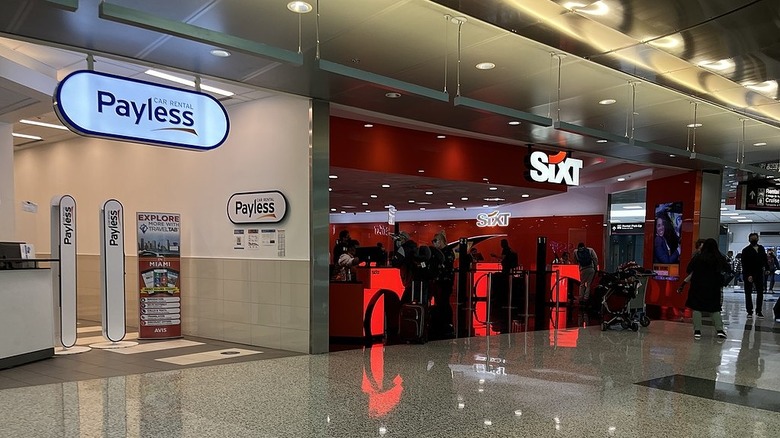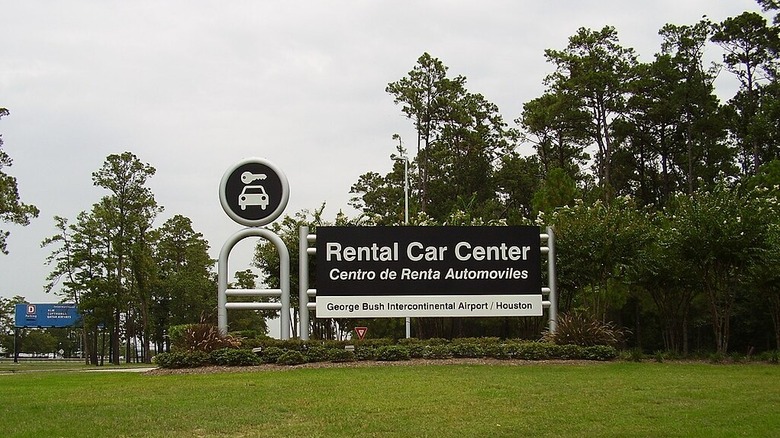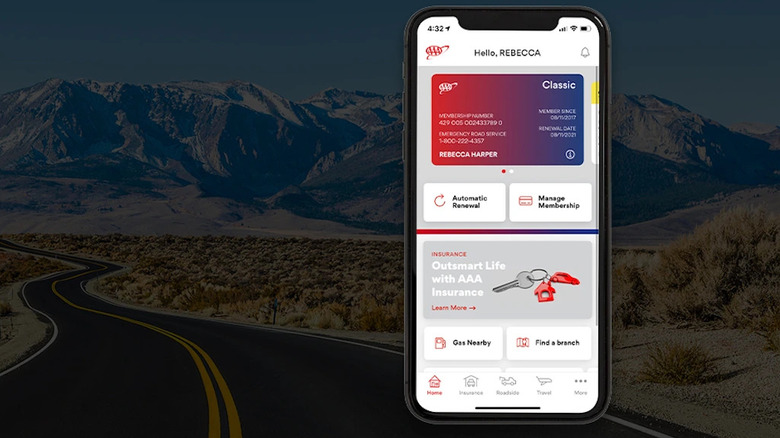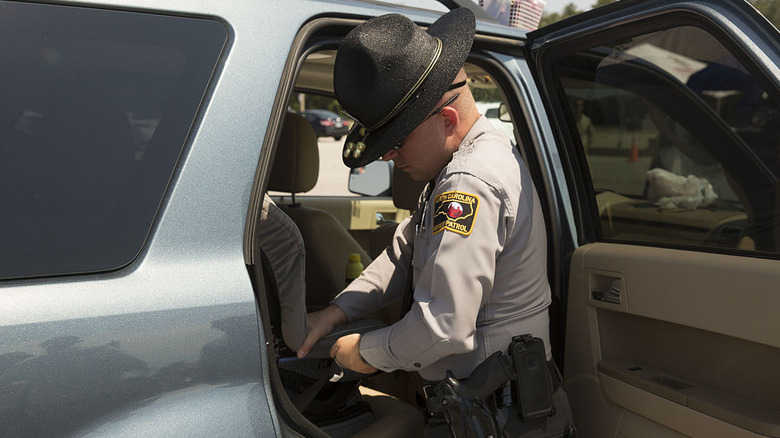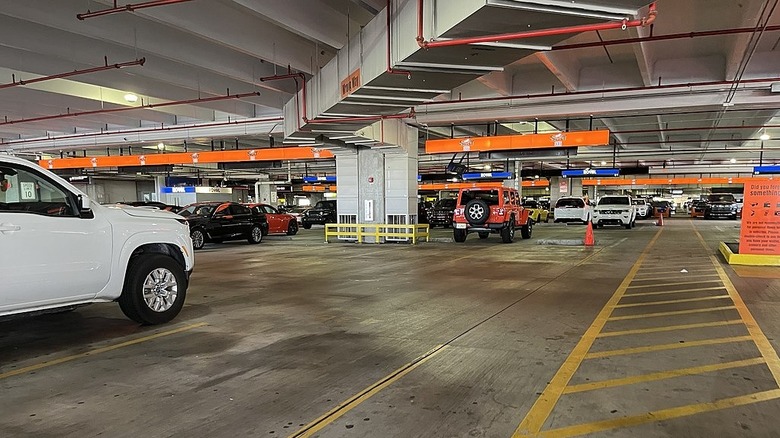10 Things You Need To Do Before Driving A Rental Car (To Avoid Hidden Fees)
While travel tips and stress-reducing road trip apps go a long way toward making your road trip smoother, driving can still be stressful. It can get complicated — especially if you need to rent a vehicle. Whether you're going cross-country or need to get to your destination after landing at an airport, renting a car often comes with mixed feelings. That's not to say rental cars (or rental car companies) are all bad. Some rental companies even offer EVs to save on gas and maybe even help the planet. Yet there are things we don't love about car rentals, and the biggest complaint? Hidden fees.
Part of having a halfway decent experience when renting a car is knowing what to expect. The first part is to understand the costs upfront so you can avoid racking up more fees than you've budgeted for. It can feel intimidating to rent a car, put down a deposit, or give a credit card number, and still find things are not quite what you expected when you arrive.
To that end, here are some things you can do to avoid hidden fees before picking up your rental car (and after you return it, too).
Compare costs
The overall expense of renting a car is probably the worst part about the experience. Fees quickly add up, from the base per-day rate to taxes, additional charges for fuel, add-ons, and more. Before you start adding things up though, consider that the upfront cost is where it all begins, and not all rental agencies charge the same rates. In fact, rental cars are notoriously more expensive at on-site airport rental agencies. In some cases, airport rentals can be more than 18% pricier than off-site ones. Airports themselves can tack on fees for the rental agencies, and there can also be fees for shuttles and other services that passengers use.
I tried this tip myself and was shocked at how the costs broke down for a rental from Enterprise at the Sacramento International Airport versus one from the same company in downtown Sacramento. I entered the same drop-off and pickup dates, and the difference was more than $35 per day. An economy rental picked up at the airport would cost $80.81 per day, while the downtown location lists the same economy vehicle (a Mitsubishi Mirage or similar) for $44.97 per day. Of course, if you choose to pick up a rental car that's a few miles from the airport, you'll need to arrange your own transportation to get there. Consider convenience, cost, and your schedule in this scenario, and you might find that the savings is worth it.
Get a total quote
When you first start shopping for a car rental, you might think it doesn't sound so bad to pay a flat amount per day. However, it's when you look at the total for your trip that things might get a little scary. Therefore, getting a total quote is crucial before you start planning your trip — and definitely before you hand over your credit card. For example, when I compared prices at Enterprise at the airport versus Enterprise in downtown Sacramento, I only requested a one-day rental (from noon to noon the next day). With the airport rental, the fees for a single day totaled $108.62, while the off-site fees totaled $49.83. Not only are taxes and fees higher at the airport, but the fine print also points out that the fees could go even higher depending on what is added later.
While some car rental sites seem to have come a long way in terms of fee transparency, not all have. Our sum-up of car rental companies ranked worst to best factored in transparency, and Enterprise was one of the best. Thrifty Car Rental, on the other hand, performed poorly in customers' experiences with added fees. Click through to right before confirming your reservation to get a clear view of what the total fees will be, including any add-ons you decide on (more on those options later).
Check your car insurance
In-house insurance coverage is typically offered at car rental agencies, although the agent at the counter might not do the best job of explaining how it works and why you might want it. In brief, consumers can be held liable for damage to the rental vehicle, thus they have to maintain a level of insurance coverage in their name. If your auto insurance is liability only, you could end up paying out of pocket if something happens to the rental. Verify your insurance coverage before heading to the rental counter, and you'll be in a better position to avoid surprise fees. If your car insurance falls short — or if you're just unsure — check your credit card benefits. Many cards include rental car insurance, but just be sure to read the fine print. Travel reward cards, specifically, tend to have rental insurance built into their offerings; Chase Sapphire, Capital One, and American Express cards are a few that might have what you need.
If, after checking your insurance coverage (and those rates), you're thinking of switching insurance providers, consider our list of major insurance companies ranked from worst to best. Rates are only part of the equation — there's also customer service, add-ons like roadside service, and more. In terms of rental car costs, better insurance coverage could save you a ton out of pocket.
Decline insurance if possible
High prices alone are enough to complain about when it comes to renting a car. Yet one of the biggest stressors can end up being the insurance dilemma. I have read horror stories of consumers being pressured into purchasing insurance coverage — coverage they thought they didn't need — at a significant expense at the rental counter. You might want to decline the coverage to save money, or at least read the fine print to decide what you need (versus what the rental agent wants you to buy).
With some car rental companies, insurance can add an exponential amount of fees to your bill. Hertz, for example, charges $45 per day for full insurance coverage. At Enterprise, where I conducted my research for a local rental, a Damage Waiver (which covers things like towing, storage, and damage) can cost "between $16.99 and $69.99 per day." Personal Effects Coverage, which covers you and your passengers' belongings — kind of like renter's insurance — starts at $5.99 per day. Supplemental Liability Protection costs $8.75 per day. On the flip side, if you go without coverage, you could have unexpected costs later on. While rental agents may try to upsell everyone, understanding the insurance options beforehand helps you avoid fee creep. Whether you cut costs by refusing in-house insurance, by selectively accepting coverage, or by confirming you're already covered, knowing your options could save you a bundle.
Look for discounts
Discounts are always going to be your best friend, whether you're trying to save money on your AT&T bill or subsidizing travel and other adventures. Tons of discount programs help you save small amounts in different areas, and together, they can make a big difference.
For example, if you have AAA insurance coverage, you can get perks like up to 20% savings on base rates and skipping charges for additional drivers. Although younger drivers are often subject to additional fees due to their assumed inexperience, you may find student discounts at some car rental agencies, like Avis. Avis offers a 20% student discount on the rental price and skips the young driver surcharge.
AARP can also get you a discount at rental agencies, with savings as high as 35%. Although AARP is often thought of as an old folks' program, there's no minimum age to join — an 18-year-old can pay the $20 per year membership fee and get all the same perks. Another avenue for discounts is joining your rental agency of choice's rewards program. Most rental agencies offer these programs, although there can be high thresholds for earning rewards. Plus, don't overlook the possibility of getting a break on car rental fees through other affiliations. Sometimes, you can get a discount just for who you are — nurses, seniors, veterans, teachers, military, firefighters, and federal employees may all qualify for discounts, depending on the rental company.
Understand fuel-up policies
Fuel-up policies are another possible headache that can lead to seemingly hidden fees by the end of your trip. Not all car rental agencies require that you fill your rental up with gas before returning it, but many do. Requirements can also vary — some companies want a full tank, while others just expect you to return it with the same level it had at pickup.
Some car rental companies offer different options for refueling. Some might charge an up-front fee and let you return the car with an empty tank. Others may refill the tank and charge you the price of gas –sometimes with an added fee. Agencies like Alamo let you prepay for the tank, after which you can return the car on fumes if you want. However, the fuel charge can vary, and you might overpay per gallon based on the going rate in the area. Once again, reading the fine print here could save you money and frustration.
Knowing that you need to refill the tank means you can keep an eye out for the cheapest gas while tooling around in your rental. It also means you can plan ahead to get gas, rather than rushing to your vehicle return time without a minute to spare. While you shouldn't actually top off the gas tank, refueling could save you money if you're willing to put in a little effort.
Uncheck the box for extras
We already know that car rental companies — like everyone else — try to upsell customers. It's a low-risk way to boost profits, and many unsuspecting consumers sign on the dotted line, then are surprised by the total bill. To avoid that scenario, keep reading the fine print and uncheck the boxes for those optional extras.
In my experience, car rental agencies typically offer some extras for free. Specifically, they tend to offer accessible add-ons for people with disabilities, and they often provide car seats for free (although you really should avoid renting a car seat for a variety of reasons). Yet if you decide to use a less conventional rental option, like Turo, the extras and corresponding fees are essentially endless. Owners can offer any extra they want and charge what they want, but you do have the power to decline.
Turo, which is a car-sharing service where private owners rent their vehicles out, allows owners to charge for all manner of things, from GPS mounts to phone mounts to mileage extensions. We've already seen that car rental companies tack on fees for gas, and while Turo lets private owners go even further, fees can crop up where you least expect them. Car rental companies already charge various surcharges (like airport fees), charge you for not recharging your EV rental, and tack on a few dollars for a late return, but skipping the extras will shave off a few bucks.
Know your mileage
While deciding whether to rent a car, you've likely mapped out your trip and are considering the fastest or most scenic way to get from point A to point B (or maybe a bunch of other points in between). Knowing how far you'll be traveling can help you avoid prepaying (and overpaying) for miles, as can thoroughly reading the rental company's fee structure for mileage. Mileage fees vary, and so do the base thresholds for permitted mileage during your trip. For example, Enterprise offered me unlimited mileage on all the vehicle options for a Sacramento-area rental car. Looking at the fine print, Enterprise appears to not have a mileage limit for most rentals, but there are exceptions. Passenger vans, large SUVs, and similar vehicles incur a cost of $0.10-$0.25 per mile over the limit of 100 miles per day.
Avis offers unlimited mileage on most of its rentals, though it doesn't specify if there's a limit for certain vehicles. Avis also promotes limitless road trips (and offers road trip ideas) as a vacation option, so here's hoping they don't charge extra for those epic road trips. Other companies charge a per-mile overage fee if you go beyond the miles that you estimated you would travel. Each agency is different, so your best bet is a combination of reading the fine print, estimating (or overestimating) your trip mileage, and going with a company that has the most lenient policies — or the cheapest rates.
Choose a single driver
Part of the checkout process when booking a rental car is choosing a driver, or multiple drivers, for the duration of the trip. The catch is that while rental agencies often allow younger drivers, they can tack on extra fees. When my family and I booked a minivan while traveling with a gaggle of toddlers, we thought long and hard about choosing more than one driver to make things easier. Budget won out over flexibility, though, and we opted for one driver to shave off those costs. Another factor was that I wasn't yet 25, and our rental agency charged a fee for younger drivers. Enterprise's current policy includes a Young Renter Fee for drivers aged 21 to 25 that costs approximately $25 per day, but fees can go as high as $64.75 per day in places like New York for drivers between 18 and 20. In most states, Hertz customers have to be 20 years old to rent a car, and they'll also pay a $25 fee per day.
One way to avoid young driver fees is by designating one mature driver for your trip. There are some alternatives, though, if you're 21 or older. Some drivers suggest that renting a U-Haul or even one of The Home Depot's vans is cheaper and easier than a rental car. The Home Depot, for one, requires drivers to be 21 to rent a van, which is lower than the minimum at many rental car agencies.
Take before photos
You can take every precaution possible before paying for your car rental, yet still wind up on the hook for fees later on. How can this happen? Sometimes unscrupulous — or simply overworked — car rental company employees completely destroy your budget after the fact. While there aren't necessarily statistics about this scenario, a quick search online for "charged for rental car damage I didn't do" turns up countless results about unfair charges for vehicle damage. It can be difficult to fight these types of allegations, but one simple step can give you peace of mind and maybe even save your wallet if it comes to a showdown between you and the rental company.
Before taking possession of the rental vehicle, do your own walk-through and record the state of the car at that time. Take photos of any existing damage (or lack thereof), do a live recording walking around the car, and make sure the rental agency's records are correct, too. In my experience, car rental companies generally have a car diagram where they mark any existing damage, which you then sign off on. Look this over carefully, inspect the car for yourself, and insist that even the smallest scratches are noted. You might feel like you're being a difficult customer, but this could help you avoid hundreds or even thousands of dollars in damages later, which would definitely ruin your trip.



